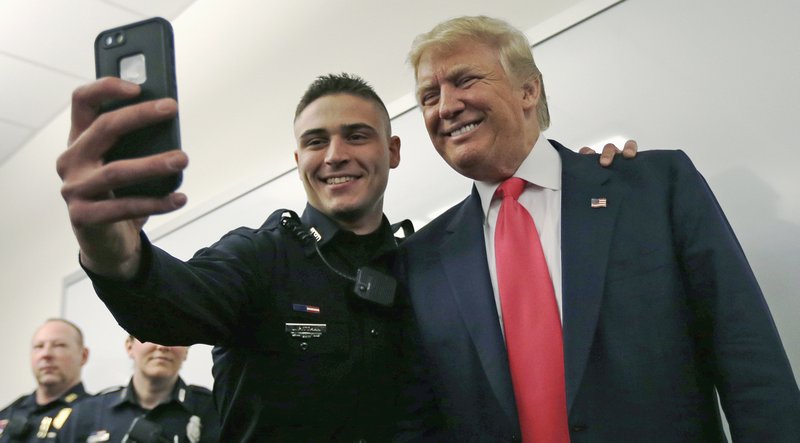EXETER, N.H. -- Donald Trump, campaigning in New Hampshire after his second-place finish in Iowa and a rally in Arkansas, appeared intent to demonstrate that his campaign has learned from any past mistakes.
With the state's primaries on Tuesday, Trump's campaign increased the day's planned events for New Hampshire from two to five -- the most he'd ever advertised on the campaign trail. He visited with business owners, answering questions and signing autographs, then offered a pep talk to several dozen police officers.
Several reporters also were invited into his campaign headquarters to chat with staff members and volunteers as he held a private meeting. In Iowa, his team had imposed a strict "radio silence" policy and shrouded its operation in secrecy.
Trump has blamed his second-place finish in Iowa on a long list of factors, including his own missteps. He's conceded he could have done better if he'd spent more time and money in the state.
"You know, I think in retrospect we should have had a better ground game," he said in an interview this week on MSNBC.
Trump's New Hampshire organization appears more robust. He's racked up dozens of endorsements, and his Manchester campaign headquarters is large and brimming with staff members and volunteers placing calls.
Trump remains ahead in polls in the state, where the electorate tends to favor more moderate candidates compared with the evangelical-leaning Republicans in Iowa.
Asked about his ground game at his campaign headquarters Thursday, Trump appeared content to stay his course.
"I feel fine. I mean, we have what we have," he told reporters after greeting volunteers.
He pointed to the reception he'd been getting, including in Exeter, where supporters packed the city's town hall building.
"People like us, we seem to be doing very well. You know, here it's a little bit less about a ground game," he added. "Here you go out and you pull a trigger, and you come back. You don't sit around for an hour and a half."
And while his team worked to increase his visibility Thursday, his visit wasn't long.
Trump, who was in Little Rock on Wednesday, was heading back out of the New Hampshire today to hold a rally in Florence, S.C. That state will hold its primary later this month.
rally to rally
Across and around New Hampshire, meanwhile, Trump's fellow Republican candidates shuttled from rally to rally, each trying to prove the best fit for the state's voters.
New Jersey Gov. Chris Christie said Thursday that Republicans in New Hampshire "should be concerned" about Marco Rubio's position on abortion, suggesting the U.S. senator from Florida is out of step with regional voters.
Christie argued Thursday that Rubio supports banning all abortions, including in cases of "rape, incest or life of the mother." Appearing on NBC, he added, "I think that's the kind of position that New Hampshire voters would really be concerned about."
Rubio has said he backs an exception for abortion when the life of the mother is in danger, and would back legislation with allowances for cases of rape and incest -- even though he personally doesn't support those exceptions.
"I understand it's a difficult issue," Rubio told reporters Thursday. "But I have to choose between the right of a person to do what they want with their body and the right of an unborn child to live. And I support and defend the right of an unborn child to live."
Former Florida Gov. Jeb Bush echoed Christie's assessment of Rubio and mixed in a few words about Ted Cruz, the winner in Iowa, calling the pair "backbenchers" in the U.S. Senate.
Cruz, however, used his campaign to address a personal issue as he spoke at a forum on drug addiction in Hooksett.
Sharing the story of his sister's overdose death, the U.S. senator from Texas spoke of "an epidemic" of addiction that has destroyed lives in his family and across the nation. His older sister, Miriam Cruz, died of a drug overdose in 2011.
Cruz then suggested his powers as president would be limited to address the issue.
"It's not going to be the government that solves this," the Texas senator said. "People have to make personal transformations."
Cruz said the federal government's role in addressing the issue should be focused on border security and illegal immigration, topics that largely have defined his presidential campaign.
"The solution to this is going to come at the state and local level. It's going to come from the church, it's going to come from charities, it's going to come from friends and families and loved ones stepping forward and saying, 'We are here for you,'" Cruz said.
"But it's also going to come from a federal government that actually does its job and secures the border. And I will tell you this, when I'm elected president, you have my solemn commitment: we will secure the borders. And we will end this plague of rampant drugs flooding into this country and destroying lives all across this nation."
Information for this article was contributed by Thomas Beaumont and Steve Peoples of The Associated Press.
A Section on 02/05/2016

